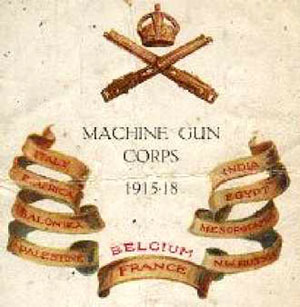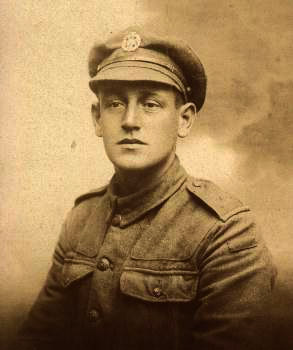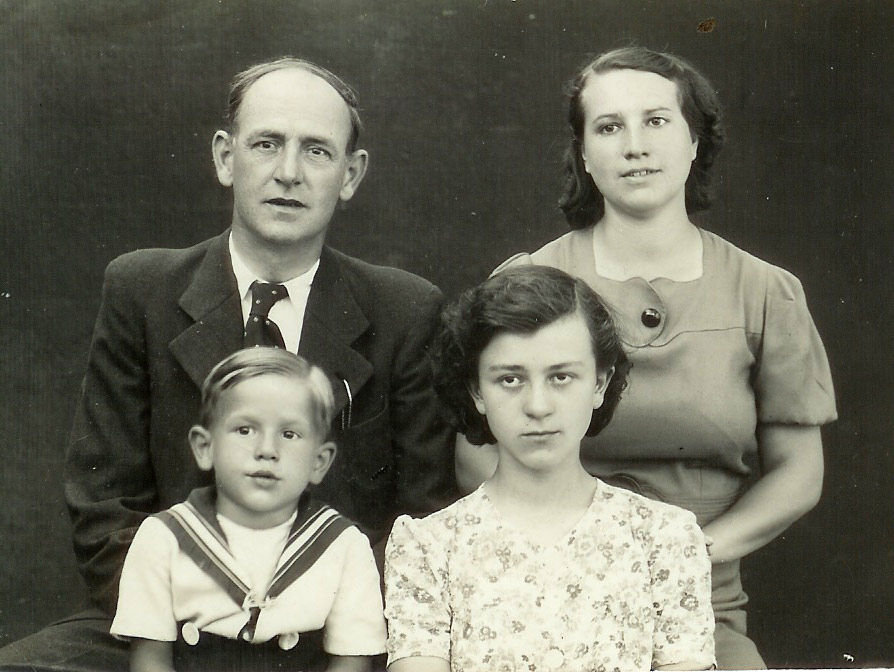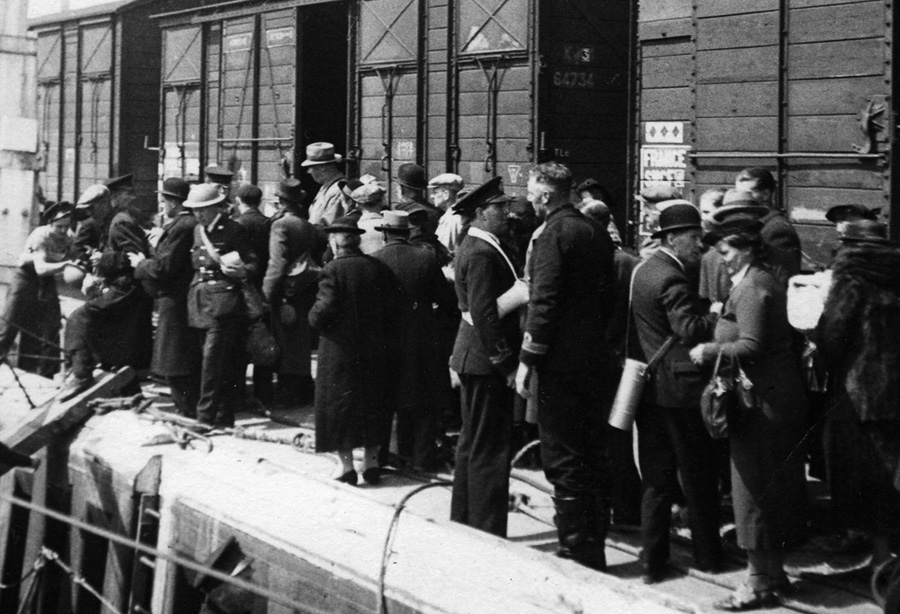







 Pierre
Ratcliffe was only five years old when he left Calais on HMS Venomous
with his parents, Albert and Renée Ratcliffe, his sixteen year old
half-sister, Gisèle, and their young cousin, Jack Ratcliffe. Albert
was born in Calais in 1891; he was the son of a colliery engineer from
Wakefield who came to France with his company in 1889. Albert was one
of eight children and served in the British Army with the Machine Gun
Corps during the First World War. He worked in Calais for an
American company exporting lace. Albert's first wife died of
tuberculosis leaving eight year old Gisèle without a Mother. Renée's
parents had emigrated to
America and she was born there in 1911, but they returned to France in
1933 during the Great Depression and she married Albert in 1934. The
family had British passports.
Pierre
Ratcliffe was only five years old when he left Calais on HMS Venomous
with his parents, Albert and Renée Ratcliffe, his sixteen year old
half-sister, Gisèle, and their young cousin, Jack Ratcliffe. Albert
was born in Calais in 1891; he was the son of a colliery engineer from
Wakefield who came to France with his company in 1889. Albert was one
of eight children and served in the British Army with the Machine Gun
Corps during the First World War. He worked in Calais for an
American company exporting lace. Albert's first wife died of
tuberculosis leaving eight year old Gisèle without a Mother. Renée's
parents had emigrated to
America and she was born there in 1911, but they returned to France in
1933 during the Great Depression and she married Albert in 1934. The
family had British passports.

Albert Ratcliffe with his his young wife Renée and his son, Pierre, and daughter, Gisèle, in Calais before the war
Courtesy of Pierre Ratcliffe
Much later in her life Gisèle described events in the days before they escaped to England on HMS Venomous and the problems they faced on arrival in England finding work and somewhere to live.
"My
memories of events in May 1940 are a bit vague. I remember some stupid
things clearly but important events are often half forgotten. We lived at 31, Rue du Jardin des Plantes in Calais. There
were one or two air raid alarms at the beginning of May but nothing
serious until the 10 May when Belgium and Holland were invaded. I
remember waking up that morning and seeing my parents looking out of my
bedroom window. I had slept through it all!
We decided to move to Sangatte to a cottage we had rented. I traveled
daily by bus from Sangatte to Calais to attend the secondary school
which was near the town hall. If there was an air raid alarm, the whole
school was taken to the town hall until the 'all clear' sounded. Yvonne
Sabau and her mother were already in Sangatte and so were the
Vanpouille family. One day, I was doing my homework in our cottage,
when a sea mine exploded, which damaged the roof at the back of the
building. Yvonne and her mother left their cottage in Sangatte to
travel south. Some people had already left the village. Following
Yvonne and her mother's departure we went to live in their home.
British
and French soldiers, RAF personnel and some British sailors were
billeted in the village. On about the 21 May, the Vanpouille who lived
next door, woke us up to tell us that the Germans were not far away. We
collected a few belongings. My Mother and Dad cycled with five year old
Pierre on a bike seat while I got a lift with a farmer. The road was
crowded with people going south - in cars, on bicycles, or walking and
pushing prams or wheelbarrows with their belongings. When we got to
Calais, I noticed there were queues outside some shops. We went to
Pierre's gram'ma while Renée, my Mother, went to the British Consulate
to see if there were plans for the evacuation of British subjects. Dad
went to our house to collect passports and a few items of value. Uncle
Harold, Dad's brother, was contacted but said they could not leave because their son,
Allen, was in Escalles. Jack Ratcliffe was there, having cycled from
Dunkirk on a stolen bike. Uncle Edmond was also told of our departure
and gave us a lift to the harbour. There was a ship evacuating British
citizens.
When
we arrived at the harbour an air raid was in progress. There were
already signs of bomb damage. We crawled under a train to shelter then
finally made it to the ship. As the ship left the harbour, I saw Allen
arriving empty handed on a bicycle and looking dejected. Most people
stayed below deck. Jack kept going up on deck as he wanted to see the
harbour taking a battering. I remember a woman being very worried
because she had left some washing on to boil. I can't remember if we
landed at Dover or Folkestone.

The
organisation on the other side of the channel was marvelous. The
authorities were ready to receive us. There were questions to be
answered and passports to be checked. The WVS (Womans Voluntary
Service) was of course there. These splendid middle class English
ladies were dishing out tea and food. They all smelled of lavender!
We went by train to London and were taken
to a large terraced building. I still don't know where it was. There
were a lot of refugees like us. We were fed and given blankets and
slept in our clothes among all these people. In the morning we were
given breakfast. Dad had a chat with a civil servant and told him he
had a sister in Leeds. I've no idea if Dad had enough money or if he
had to pay for anything, seeing we left in such a hurry. We went to
Leeds by train. Auntie Pattie, Uncle Jack and Gram'ma were very
surprised when they opened their door to us. They seemed to have no
idea that conditions were so bad in France. Pierre went out into the
street. Being a chatterbox he was soon talking away in French to a
group of children. He came back in the house and announced that all the
children were deaf.
Auntie Pattie and Uncle Jack agreed to
young Jack, our cousin, living with them. A few days after our arrival
in Leeds we went to Nottingham where Dad I think had some contacts
through the lace trade. We were in rooms in Arnold. No luck there for
Dad. We came back to Leeds and rented some rooms in Meanwood. I can't
remember how but eventually, after leaving Leeds once more, Dad got a
job in Newark-on-Trent. He was talking to a bus conductor, telling him
he had just got himself a job but had no idea where he and his family
were going to live. The bus conductor generously said we could come and
stay with him and his wife. We all moved to the bus conductor's house
in Newark.
They were a very young couple, newly married, the wife was only
nineteen. The furniture in the house was minimal - I think we slept on
camp beds. They were kind and generous but it was far from being an
ideal situation.
I went to the local primary school so I
could improve my English. Being sixteen, I felt out of place but the
teachers were kind and understanding and used to take me aside for an
hour or two to teach me. The children were lovely and it used to amuse
me to hear them sing.
It was difficult for both families at the bus conductors house, a
small three bedroom council house. Something had to be done. I have a
feeling they didn't know what to do. Renée being born in the USA was
eligible for repatriation. She thought that if she went to the States,
she could get Dad a job at the head office of Stern and Stern - that is
what I understood at the time. She decided to go with Pierre.
Dad and I moved. We rented rooms with the
use of kitchen a few miles outside Newark-on-Trent. The lady of the
house lived there with her young daughter. I think her husband was in
the forces. I enrolled at the technical college to study English, life
drawing and dress designing. We missed being a complete family.
Saturday we went to the cinema and had fish and chips for supper. Dad
used to buy a large bottle of cider; we drank that after supper. He
used to tell me that it wasn't alcoholic but of course it is. Life was
not easy in the States. There was no job for Dad. After eight months,
Pierre and Renée came back.
We went back to Leeds and Dad got another
job. We rented a flat above a shop in Meanwood. And eventually we moved
into a house. Life became easier. Renée got a job and I started work in
a chemist shop. I remember I was paid 17/6 a week. Pierre was at school
and we were not far from Auntie Pattie, Uncle Jack and Gram'ma.
I personally felt I ought to do something
for the war effort. I did not want to be called up for the forces and I
certainly did not want to go into munitions work. I remember girls who
worked in munitions factories coming into the shop; some of them had
jaundice due to the materials and chemicals they used. I rather fancied
the open air and the countryside and all being well, perhaps nursing
later on. I noticed all the land girls looked fit and well.
On my eighteenth birthday on my afternoon
off from the shop, I went to town and enrolled for the Land Army. I
only told Auntie Pattie. I was declared physically fit to work on the
land by the local doctor and in September I was off for a month
training at an agricultural college."
Gisèle enjoyed her years working as a Land Girl near Lake Bala in
North Wales and Pierre remembered visiting her on holiday during the
summer of 1944:
"There
were many girls there at the hostel where they stayed and I loved it
... being tucked in bed by the girls, especially Rosemary. Rosemary and
Gisèle were great friends ever after. Rosemary came to Calais after the
war ... They were looking for young men to marry!"
The
Women’s Land Army and the Women’s Timber Corps, known as the Land Girls
and Lumber Jills, worked on farms to feed the nation and fell timber,
as the men went to war. At its peak in 1943 there were some 80,000
women working on the land, and it was continued after the war, finally
being disbanded in 1950.
Gisèle trained as a nurse in Bradford and when the war
ended she remained in England and became a nurse in York. She married
Edward Richard Mack a civil servant in the army ordinance corps. They
moved to Nottingham then went to Aden for four years and on returning
to England lived in London. Gisèle died on the 9 December 2011.
When Albert and his family left Calais for England aboard HMS Venomous he left behind three brothers who had fought for Britain in World War I. Harold Ratcliffe was born in 1898 and was eighteen when he enlisted in 1916. After the war he managed the co-operative wholesale society in Calais (la Coopérative Anglaise) founded by his father. In July 1940 he was arrested by the Germans, imprisoned in Lille and at Huy Fortress, Belgium, and finally at Tost (Toszek) internment camp in Upper Silesia but survived to return to Calais. His son, Allen, was active in the Resistance, was captured and died of typhoid in Dachau. Frank was a year younger and enlisted in 1917, was badly gassed and was an invalid for the rest of his life. In July 1940 he was living at Malo les Bains with his wife and two children. He was an active member of the British Legion and helped destroy equipment left by the BEF so that it did not fall into enemy hands. He was arrested by the Germans and imprisoned in Lille but as a war invalid was set free on parole but had to report regularly to the German authorities. He died in 1944 in Lille. Allen born in 1895 also fought in the Great War and afterwards lived in Paris where he worked for an American art gallery. In 1940 he fled to the "Zone Libre" in the south of France to avoid being arrested. His wife and daughter stayed in Paris. He had also been severely gassed in the Great War and this contributed to his death from tuberculosis in May 1945 . All three brothers were born in France but under French law were allowed to take the nationality of their father. They had British passports and could have left Calais for Britain.
Pierre
Ratcliffe's older cousin, Jack Ratcliffe, joined the RAF towards the end of the
war. He married in England, had a baby girl and after working as a salesman
became a French teacher at a school in Leeds.
By
the time the Ratcliffe family returned to Calais from Britain in
January 1946 Pierre, the little chatterbox who knew no English had
forgotten his French, but he was a bright boy and soon caught up. He
entered the Ecole des Mines de Saint-Etienne in 1957 and graduated in
1960 and then had to do his two years of military service before he
began a successful career as a mining engineer. His
wife's family also came from Calais. They had three children and seven
grand children and live in retirement in Callian inland from Fréjus. Pierre Ratcliffe, the French son of a
French born British subject who fought in the British Army in the Great War and grandson of a miner from Doncaster, is
proud to have dual nationality. If
you would like to know more about the Ratcliffe family and events in
Calais after they left for England in May 1940 follow this link to his web site.
Return to the Evacuation of British citizens from Calais in May 1940
The story of HMS Venomous is told by Bob Moore and Captain John Rodgaard USN (Ret) in
A Hard Fought Ship